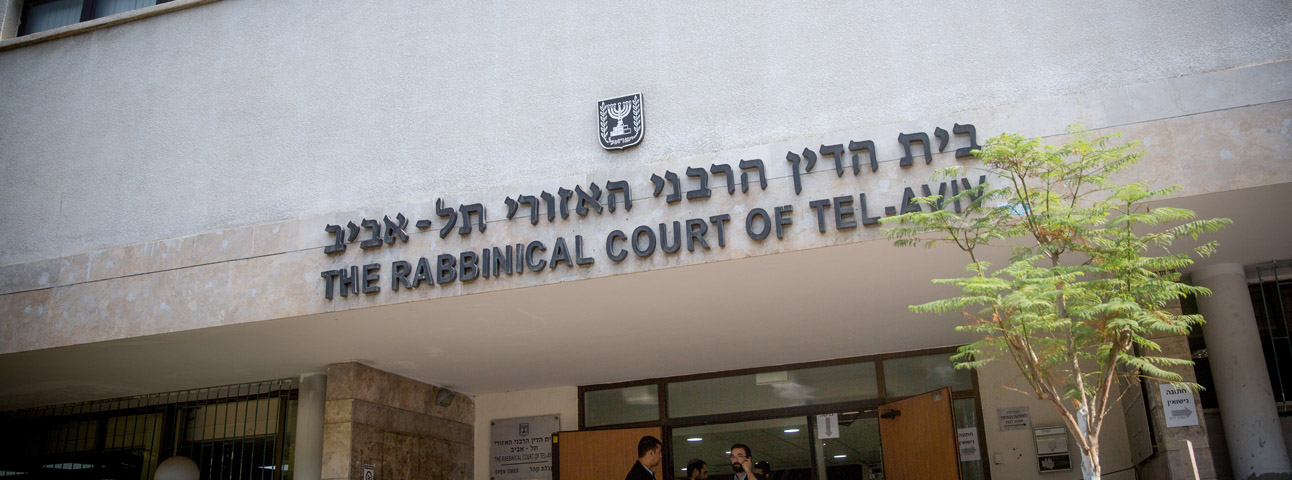1/3 of Complaints against Rabbinical Judges in Israel are Justified
A new study by IDI expert Ariel Finkelstein presents a detailed and systematic analysis of the conduct of Israel's rabbinical courts - finds 30% of complaints categorized as: "Violation of the Principles of Natural Justice"

Flash 90
A new study published by the Israel Democracy Institute presents for the first time a detailed and systematic analysis of the conduct of Israel's rabbinical courts, examining them from the point of view of public administration and the quality of service as well as compliance with judicial norms. The study by Ariel Finkelstein, a researcher at IDI's Center for Religion, Nation and the State, presents a complex picture showing that while rabbinical courts have undergone significant improvement in recent years in the quality of service, there are still significant shortcomings in their conduct as a Judicial Tribunals.
Finkelstein, explains that "in terms of quality of service, rabbinical courts have undergone significant improvements the past decade and a half, which include a stricter approach to unacceptable norms on behalf of the dayanim (rabbinical judges), characterized by delays and absences that harmed the litigants. Moreover, cooperation between the Rabbinical Courts and the Ministry of Labor, Social Affairs, and Social Services is considered to be more successful than with Family Courts and over the past decade despite the stagnant number of judges it employs, the time taken to process divorce cases has been shortened. "
At the same time, a comprehensive statistical analysis of petitions presented to the Complaints Commission on Judges and Dayanim over the years, portrays significant shortcomings. For example, 32.7% of complaints about dayanim in Rabbinical Courts between the years of 2008 to 2019 were found to be justified, compared with 16.8% of complaints against judges in Magistrates' Courts, 16.1% in Family Courts, 13.9% in District Courts and only 8.1% about judges in The Supreme Court. Moreover, many of the justified complaints against dayanim in Rabbinical Courts touched on the essence of judicial norms: 30% of justified complaints against dayanim were in the serious category of violation of the principles of natural justice, including complaints regarding conflicts of interest, prejudice and violation of the right to argue, violation of the right of representation and violation of equality between the sides. In all other courts combined, only 10% of the justified complaints were in these categories.
On the basis of a qualitative analysis of these complaints, four serious problems arise in the conduct of the Rabbinical Courts: (1) the judicial temperament of the judges; (2) involvement of external parties in the decisions of the tribunal; (3) the involvement of judges in the decisions of their colleagues in a conflict of interest; (4) violation of the right of the litigants to present their arguments.
Finkelstein notes that "the general feeling that arises when reading the reports of the Public Complaints Commission on Judges is that some of the hearings in the courts are conducted in some respects as a 'shtetel' (small Jewish village) and not as a court of law."
As a result of the findings, Finkelstein recommends strengthening the status of the Rabbinical Courts as a court of law. He also proposes the transfer of the Rabbinical Courts from under the jurisdiction of the Ministry of Religious Affairs to that of the Ministry of Justice and to separate the Chief Rabbinate from the Rabbinical Courts, so that the Chief Rabbis will not serve as presidents of the Grand Rabbinical Court, but rather that these positions be filled by judges from the court itself, similar to the practice at the Supreme Court.
"The close ties between the Chief Rabbis and political parties cause administrative decisions concerning the courts to be made under the pressure and influence of political and party interests," Finkelstein added. "Additionally, as many dayanim and rabbis have explained, it is difficult to ignore the fact that many of the Chief Rabbis elected in recent decades have lacked the Torah knowledge and temperament required to serve president of the Grand Court, making it an imperative to implement these recommendations from a religious perspective as well."
Justified complaints between 2006-2019, by type of complaint and court of law (%)
Rabbinical Courts
Other Courts
